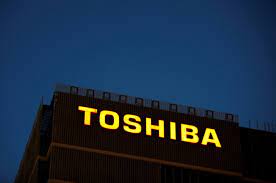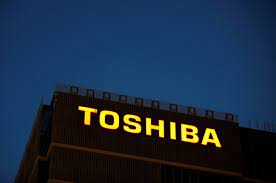
Toshiba Corp shareholders rejected opposing proposals on Thursday, one proposed by management and the other backed by dissident shareholders, casting doubt on the company's future course.
Both management's intention to spin off Toshiba's devices segment and a second request for buyout offers failed to garner the needed 50% of votes.
The sloppy decision means that a four-year scandal-plagued war between management and overseas activist hedge funds will not be resolved anytime soon, while also highlighting significant differences within Toshiba shareholders.
Toshiba's intentions to break up the corporation were met with significant opposition, including from proxy advisory firms, and its failure is unsurprising.
However, the prospects for 3D Investment Partners' proposal that Toshiba seek private equity takeover offers or a minority investment were less certain.
Despite the support of 3D and Toshiba's other two largest shareholders for a buyout bid, proxy advice company Institutional Shareholder Services (ISS) advised against it, stating that the plan "appears too prescriptive and premature."
It's unclear where Toshiba management will go from here, however the company is anticipated to amend its reorganisation plan, and some experts believe some businesses, such as Toshiba Tec, which develops point-of-sale systems and copiers, may be sold.
Toshiba's new CEO Taro Shimada, a former Siemens AG executive, indicated simply that the corporation "will evaluate various strategic choices" at the end of the extraordinary general meeting.
Following the announcement, Toshiba's stock dropped 0.5 per cent.
The outcomes, according to some observers, were a big setback for activist hedge funds.
"It looks terrible for the activists primarily because they don't have a big enough stake to dictate the voting and are unwilling to commit further capital," said David Baran, co-founder of fund management firm Symphony Financial Partners.
"They're trapped. They thought they could get away with their U.S.-style tactics because it made sense to them. Well, how's that working out?" he added.
However, the push for a buyout, which might provide excellent returns for hedge funds that invested in the crisis-plagued company, is far from done.
Activist shareholders aim to battle on regardless of the outcome of the vote to push the corporation to reopen talks with private equity companies, according to persons familiar with the situation who spoke on the condition of anonymity to Reuters.
Some shareholders believe that at Toshiba's annual shareholders meeting in June, one or two prominent investors would propose their own members for the board, forcing the corporation to seek private equity acquisition offers.
Toshiba made negotiations with private equity companies during its five-month strategic review last year, but decided not to accept any potential proposals.
Toshiba also pulled away from advanced talks with Brookfield Asset Management of Canada for a minority investment, according to sources, who added that other private equity firms with which Toshiba had discussions included KKR & Co Inc and Bain Capital. Toshiba claims that the potential takeover offers were not enticing enough.
Toshiba's board of directors will also be a hot topic, following complaints that it performed a poor strategy study that led to the company's planned breakup.
According to ISS, Paul Brough, the chair of the five-member strategic review group, has suggested that if the separation proposal is defeated, he will reconsider his position.
Since selling 600 billion yen ($5 billion) of stock to dozens of overseas hedge funds during a crisis emerging from the bankruptcy of its U.S. nuclear power company in 2017, Toshiba's management has been under fire from activist funds.
In the last two years, the enmity between the two groups has reached a boiling point. Toshiba colluded with Japan's trade ministry, which views the conglomerate as a strategic asset due to its nuclear reactor and defence technology, to prevent foreign investors from gaining influence at its 2020 shareholder meeting, according to a shareholder-commissioned investigation released in June.
(Sourcee:www.livemint.com)
Both management's intention to spin off Toshiba's devices segment and a second request for buyout offers failed to garner the needed 50% of votes.
The sloppy decision means that a four-year scandal-plagued war between management and overseas activist hedge funds will not be resolved anytime soon, while also highlighting significant differences within Toshiba shareholders.
Toshiba's intentions to break up the corporation were met with significant opposition, including from proxy advisory firms, and its failure is unsurprising.
However, the prospects for 3D Investment Partners' proposal that Toshiba seek private equity takeover offers or a minority investment were less certain.
Despite the support of 3D and Toshiba's other two largest shareholders for a buyout bid, proxy advice company Institutional Shareholder Services (ISS) advised against it, stating that the plan "appears too prescriptive and premature."
It's unclear where Toshiba management will go from here, however the company is anticipated to amend its reorganisation plan, and some experts believe some businesses, such as Toshiba Tec, which develops point-of-sale systems and copiers, may be sold.
Toshiba's new CEO Taro Shimada, a former Siemens AG executive, indicated simply that the corporation "will evaluate various strategic choices" at the end of the extraordinary general meeting.
Following the announcement, Toshiba's stock dropped 0.5 per cent.
The outcomes, according to some observers, were a big setback for activist hedge funds.
"It looks terrible for the activists primarily because they don't have a big enough stake to dictate the voting and are unwilling to commit further capital," said David Baran, co-founder of fund management firm Symphony Financial Partners.
"They're trapped. They thought they could get away with their U.S.-style tactics because it made sense to them. Well, how's that working out?" he added.
However, the push for a buyout, which might provide excellent returns for hedge funds that invested in the crisis-plagued company, is far from done.
Activist shareholders aim to battle on regardless of the outcome of the vote to push the corporation to reopen talks with private equity companies, according to persons familiar with the situation who spoke on the condition of anonymity to Reuters.
Some shareholders believe that at Toshiba's annual shareholders meeting in June, one or two prominent investors would propose their own members for the board, forcing the corporation to seek private equity acquisition offers.
Toshiba made negotiations with private equity companies during its five-month strategic review last year, but decided not to accept any potential proposals.
Toshiba also pulled away from advanced talks with Brookfield Asset Management of Canada for a minority investment, according to sources, who added that other private equity firms with which Toshiba had discussions included KKR & Co Inc and Bain Capital. Toshiba claims that the potential takeover offers were not enticing enough.
Toshiba's board of directors will also be a hot topic, following complaints that it performed a poor strategy study that led to the company's planned breakup.
According to ISS, Paul Brough, the chair of the five-member strategic review group, has suggested that if the separation proposal is defeated, he will reconsider his position.
Since selling 600 billion yen ($5 billion) of stock to dozens of overseas hedge funds during a crisis emerging from the bankruptcy of its U.S. nuclear power company in 2017, Toshiba's management has been under fire from activist funds.
In the last two years, the enmity between the two groups has reached a boiling point. Toshiba colluded with Japan's trade ministry, which views the conglomerate as a strategic asset due to its nuclear reactor and defence technology, to prevent foreign investors from gaining influence at its 2020 shareholder meeting, according to a shareholder-commissioned investigation released in June.
(Sourcee:www.livemint.com)














